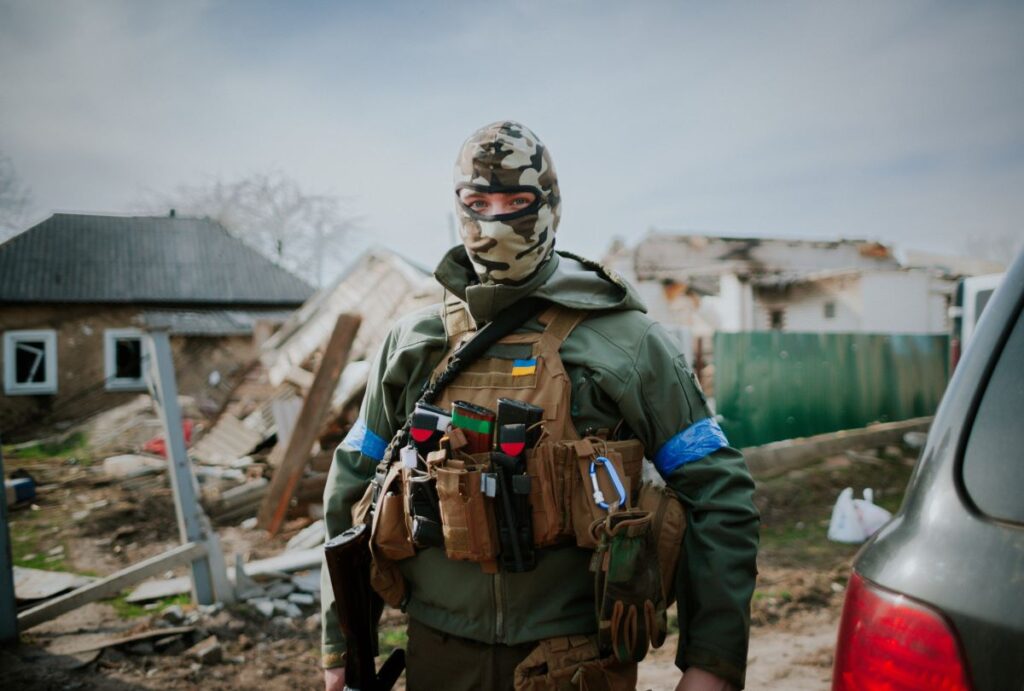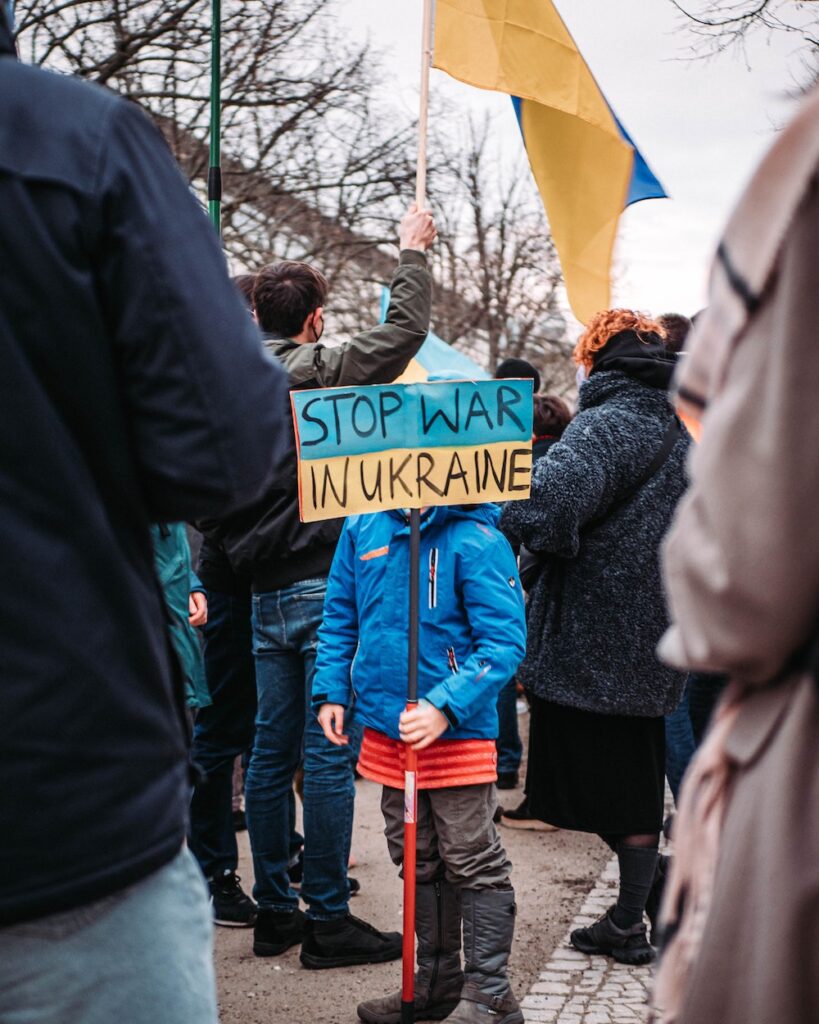The war in Ukraine resuscitated a certain dangerous fascination for war. Notions such as patriotism, democratic values, the right side of history, or a new fight for freedom are mobilized as imperatives for everyone to take a side in this war. It is not surprising then that a large number of so-called foreign fighters are willing to go to Ukraine to join one side or the other.
I met a few of them recently at the Poland-Ukraine border, where I was conducting interviews with a Norwegian film crew with soldiers and foreign fighters who were either entering or exiting the war zone. Some of them actually never got to fight or be “recruited” as they lack military experience or proper motivation. It’s a mixed group of people, some of whom have spent years in the military, while others only did military service. Some have family at home waiting for them; others, no home to go back to. Some have strong ideological motivations; others are just willing to shoot at something or someone. There is also a big group of former soldiers who transitioned towards humanitarian work.
As we were crossing the border to get into Ukraine, a former US soldier told me: “The reason why many retired or former soldiers moved to humanitarian work might easily be the need for excitement.” Once you leave the military, the closest activity that can take you to the “fun zone,” as another one said, referring to the war zone in Ukraine, is humanitarian work – or, in fact, a series of other businesses mushrooming in the proximity of war, including contractors and criminal activities.

“We are adrenaline junkies,” the former US soldier said, although he now only wants to help civilians, something he sees as “a part of my process of healing.” What many of the foreign fighters have in common is the need to find a purpose in life. But what does this say of our societies if, to search for a meaningful life, thousands are willing to go to war?
There is dominant propaganda that seems to suggest war can be conducted according to a set of acceptable, standardized and abstract rules. It puts forth an idea of a well-behaved war where only military targets are destroyed, force is not used in excess, and right and wrong are clearly defined. This rhetoric is used by governments and mass media propaganda (with the military industry celebrating) to make war more acceptable, even attractive, for the masses.
Whatever deviates from this idea of a proper and noble war is considered an exception. US soldiers torturing prisoners in Abu Ghraib: an exception. German soldiers playing with a human skull in Afghanistan: an exception. The US soldier who went on a house-to-house rampage in an Afghan village, killing 16 civilians including several children with no reason: an exception. War crimes committed by Australian troops in Afghanistan: an exception. Iraqi prisoners tortured by British troops: an exception.
Similar stories are emerging in the current war in Ukraine too, even though mostly still “unconfirmed”. With the information war obfuscating the distinction between reality and fantasy, we don’t know if and when we will be able to verify videos such as one showing a Ukrainian soldier talking on the phone with the mom of a killed Russian soldier and making fun of her, or Ukrainian soldiers shooting prisoners to make them permanently injured, or news about Russian soldiers sexually assaulting women.
All exceptions? No. This is exactly what war is. Governments make big efforts to explain that these kinds of episodes don’t belong in war. They even pretend to be surprised when civilians are killed, even though systematically targeting civilians is a feature of all contemporary wars; for example, over 387,000 civilians were killed in the US post-9/11 wars alone, with more likely to die from those wars’ reverberating impacts.
The idea of a clean and efficient war is a lie. War is a chaotic universe of military strategies intertwined with inhumanity, violations, uncertainty, doubts, and deceit. In all combat zones emotions such as fear, shame, joy, excitement, surprise, anger, cruelty, and compassion co-exist.
We also know that whatever the real reasons for war, identifying the enemy is a crucial element of every call for conflict. In order to be able to kill – systematically – it is not enough to make fighters disregard the enemy, to despise him or her; it is also necessary to make them see in the foe an obstacle to a better future. For this reason, war consistently requires the transformation of a person’s identity from the status of an individual to a member of a defined, and hated enemy group.
If the only objective of war is the mere physical elimination of the enemy, then how do we explain why the torture and destruction of bodies both dead and alive is practiced with such ferocity on so many battlefields? Although in abstract terms such violence appears unimaginable, it becomes possible to visualize when the murdered or tortured are aligned with dehumanizing representations portraying them as usurpers, cowards, filthy, paltry, unfaithful, vile, disobedient – representations that travel fast in mainstream and social media. War violence is a dramatic attempt to transform, redefine and establish social boundaries; to affirm one’s own existence and deny that of the other. Therefore, the violence produced by war is not mere empirical fact, but also a form of social communication.
It follows that war cannot be simply described as the by-product of political decisions from above; it is also determined by participation and initiatives from below. This can take the form of extreme brutal violence or torture, but also as resistance to the logic of war. It is the case of the military personnel who object to being part of a specific war or mission: examples range from conscientious objection during wartime, to explicit positioning such as the case of the Fort Hood Three who refused to go to Vietnam considering that war “illegal, immoral, and unjust,” and the refusal of the Russian National Guard to go to Ukraine.
“War is so unjust and ugly that all who wage it must try to stifle the voice of conscience within themselves,” wrote Leo Tolstoy. But it’s like holding your breath underwater – you can’t do it for long, even if you are trained.
This text was originally published in Common Dreams.
Antonio De Lauri is a Research Professor at the Chr. Michelsen Institute, the Director of the Norwegian Centre for Humanitarian Studies, and a contributor to the Costs of War Project of the Watson Institute for International and Public Affairs at Brown University. He received an ERC grant for a project on soldiering and warfare.
Cite as: De Lauri, Antonio. 2022. “The idea of a clean and efficient war is a dangerous lie.” FocaalBlog, 18 April. https://www.focaalblog.com/2022/04/18/antonio-de-lauri-the-idea-of-a-clean-and-efficient-war-is-a-dangerous-lie
